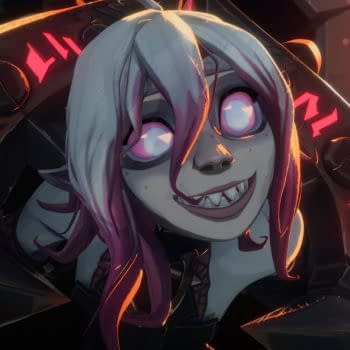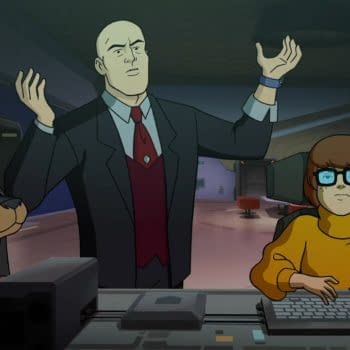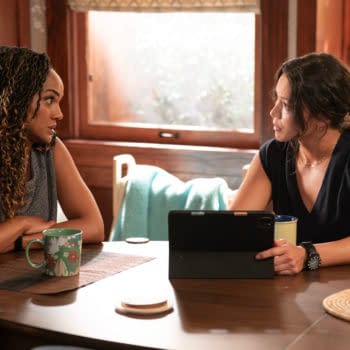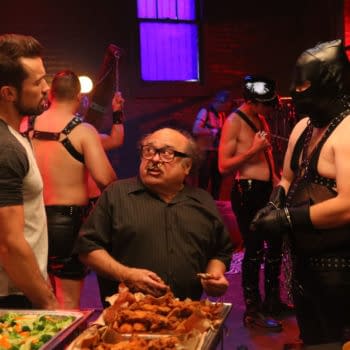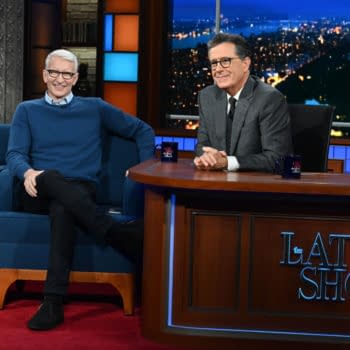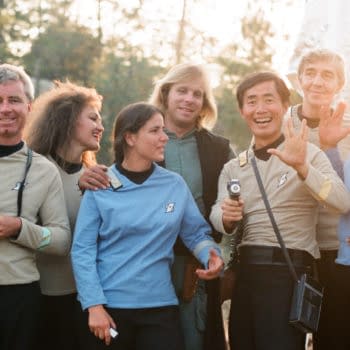Posted in: SYFY, TV | Tagged: chucky, don mancini, Joseph LoDuca, syfy, USA Network, Zackary Arthur
Chucky Composer Joe LoDuca Still Finds New Ways to Scare Us: Interview
One of the most original and unique shows spawned in 2021 is the new Chucky series on SYFY. The murder-happy plaything has changed quite a bit over the years since his terrifying introduction in the 80's Child's Play franchise. He's fallen in love, gave birth to a gender-fluid child (also a doll somehow), and recently inserted himself into the life of a gay high school student to help him take revenge on his bullies. Scoring the continuing saga of everyone's favorite homicidal possessed doll is Detroit's own musical horror master & two-time Emmy-winning composer Joseph LoDuca (The Evil Dead films, The Boogeyman films, American Gothic ). A longtime collaborator of Chucky's creator Don Mancini, LoDuca is well aware that what used to be scary isn't as scary as it used to be. Composing for horror projects since The Evil Dead, his challenge now is to keep innovating and coming up with new ways to bring the scare to sound. With jump scares not getting the same reaction as they used to, he aims to hooke the audience with a building sense of dread. Recently, on the heels of the announcement of a second terrifying season of Chucky, LoDuca sat down with Bleeding Cool to discuss the music of the show, why Chucky has been so popular over the years, and the importance of Chucky embracing the LGBTQ community.
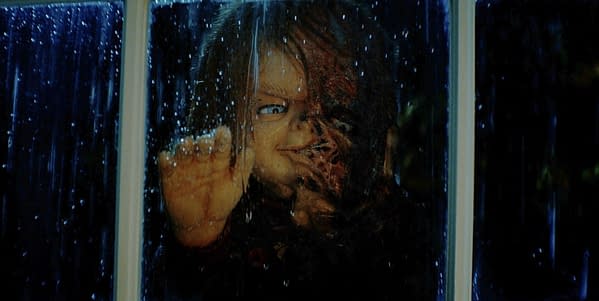
You've been the main musical voice for a little while now. "Curse of Chucky," "The Cult of Chucky," and now the "Chucky" series. What do you think it is about Chucky that makes him last in pop culture?
JL: One of the reasons Chucky continues to thrill if you will, is that that combination of preternatural evil in a child's toy with the most cynical foul mouth creature you could imagine. I think Don's [Mancini's] masterstroke here is that he placed the symbol of chaos- Chucky is a metaphor for chaos- and he placed it in the suburban middle school in Hackensack, New Jersey. What that does to these families, these kids, and their lives that already have enough to deal with. I think that's what's fascinating, and that's why the series has really done very, very well.
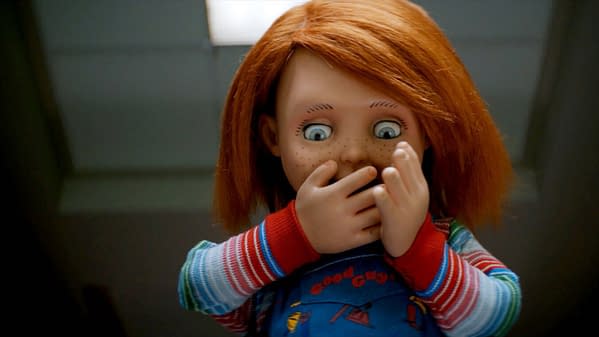
What's your process for composing for an episode? Do you work from a script beforehand or do you have some ideas going in but then wait to see the actual visuals?
JL: I see the scripts ahead of time, this has been a while in the works. I think I read the pilot script over two years ago. I was impressed that there was enough interest for the cult fans to keep them totally engaged, this suggestion of the back story of how Chucky became Chucky, and the idea of introducing it to a new generation. To have it actually be a YA series. Because everything moves so fast, you just wait to see what's been shot, what the editors have come up with, and how to tie it all together. That's my function, to look for the ways where I can glue this all together. What's important to keep the drama moving? There's a lot of licensed songs. Because we have that youth element and audience there's The Go-Go's and Billie Eilish and all these other songs that get thrown into the mix. How to write in and out of them, try to do that seamlessly, and in some cases weave them together to keep the dread going. You never know when it's going to jump off and when Chucky is going to strike.
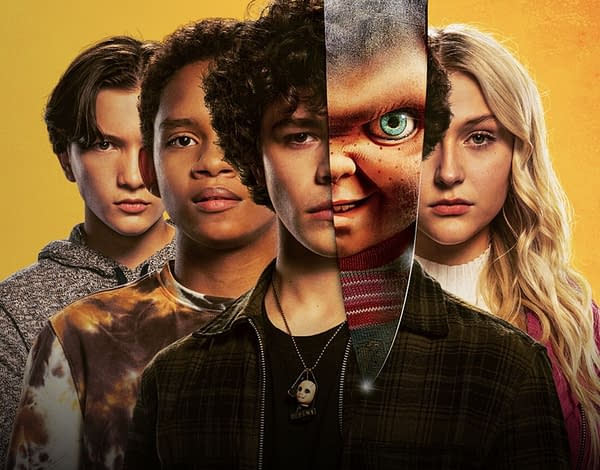
Do you compose different stings or musical cues for different characters for the show?
JL: Not so much that there is an overriding theme that gets developed, it's really only hinted at for many episodes. Our lead character, Jake [Zackary Arthur], is gay. His boyfriend and the development of their relationship are kind of hinted at in the first episode when Devin [Björgvin Arnarson] is playing piano at the talent show. The idea that Devon's associated with the piano and it's really the only time in the series where I will use a straight keyboard piano sound is when they're together. It actually plays into a song in the fifth episode, almost hinting at that sort of pop style of piano playing. You mentioned the iconic "Chucky" theme, which actually comes from "Child's Play 2," is most helpful in the relationship between Chucky and the sort of autistic younger sister Caroline [Carina Battrick]. That works pretty well for that. I wrote a theme because when I came on board, Don really said that there hadn't been any really consistent use of music throughout the previous films. I wrote a theme which we happened to keep using that is done on a toy piano, but it implies something more sinister.
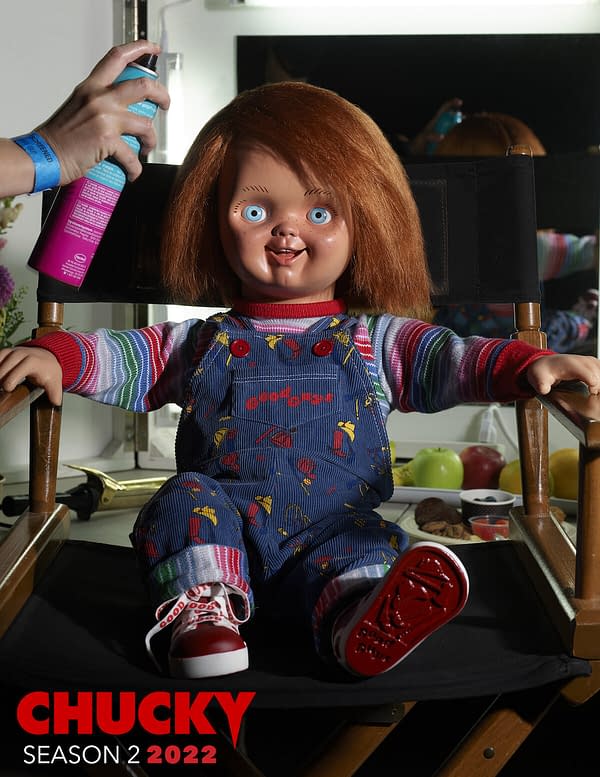
Let's talk about what some people online are calling the "Pride of Chucky". The franchise itself seems to be the first horror icon to fully embrace the LGBTQ community. Do you have any thoughts on how that's important to the character and the longevity of the franchise?
JL: I think it's very interesting that it is being received in that way. Don certainly has always implied it and there are autobiographical elements for (him). It's important that it's incorporated into this universe as well. Chucky's chaos and you have people living their lives. And what that does, to relationships, whatever their orientation. It's important and it's completely a given. It's the reason for Chucky's father's death, but it's also because you have other parents that are completely accepting. You get the full spectrum of. There are these elements of reality, they are thrown into this, and I try to treat them in a way so that they don't really come off as melodrama. They actually come off as real moments, even though there's no way you can take the universe of Chucky totally serious.
When you first started composing for horror, the music scares came from the instruments themselves. You would use and abuse them to get as much unsettling sound out of them as possible. How has that changed?
JL: I just had fun doing the music. Having done horror for this long you've got to find new ways. The audience is more sophisticated even, unfortunately, we've been desensitized. You've got to find new ways to create that dread. Nowadays, a lot of that's done on the computer, a lot of that's done in the box. That's what makes it interesting. To create this kind of soundscape that you can do so easily, that would have been so difficult to do before we had all these toys at our disposal.




